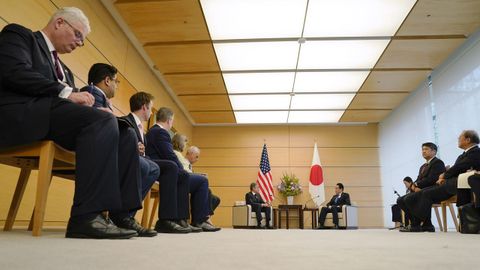
G7 foreign ministers meeting in Tokyo with US Secretary of State Antony Blinken KIMIMASA MAYAMAPOOL | EFE
Foreign ministers reiterated the importance of “peace and stability” in the Taiwan Strait
Ministers of Foreign Affairs of the G7 they increased their commitment to support Kiev “as long as” and “in all ways” that are necessary, and warned China about its expansionism in the Asian zone and for his maneuvers around Taiwan.
The G7 sent these messages to Moscow and Beijing at the end of the meeting held in the Japanese city of Karuizawa, which was attended by G7 members in addition to Germany, Canada, the USA, France, Italy, Japan and the United Kingdom. EU) wanted to show a firm and unified position in the face of the common challenges they face.
The G7 meeting was held against the background of protracted fighting in Ukraine and with Russian soldiers in defensive positions in the occupied southern regions against a possible counter-offensive by Kiev, and after a new rise in tension in the Asian zone due to the situation in Taiwan and the escalation of arms on the Korean peninsula.
The G7 foreign ministers promised to strengthen their sanctions against Russia and to “support Ukraine as long as necessary” and “with all possible means” to repel Russian aggression.
US Secretary of State, Anthony Blinkenhe pointed out in this regard that “Russia loses its attempt to conquer” and that the G7 and other like-minded countries are “determined to side with Ukraine” and support it “to regain its territory”, in addition to “reminding the world who is the aggressor” in this conflict. “Russia must immediately and unconditionally withdraw all its forces and equipment from Ukraine,” reads the joint statement adopted today at the end of the meeting.
The text also refers to third countries aiding Russia in its invasion and threatens “serious costs” for those who circumvent or undermine sanctions imposed by the group on Moscow. Also warns with “serious consequences” for Russia if it resorts to using nuclear weaponsbiological or chemical.
Dialogue for peace is an option not currently being considered in the G7, as Russia “continues to violate international law with its invasion” and “insists that the occupied territories of Ukraine will not be subject to negotiations,” he said. For his part, Japanese Foreign Minister Yoshimasa Hayashi, who presided over the meeting.
Unity against China
The G7 wanted to make it clear that it maintains a common position on China’s military rise and the situation in Taiwan, following the uproar caused by some statements by French President Emmanuel Macron, following his recent visit to Beijing, in which he called for greater European autonomy vis-à-vis Washington on these issues.
The Group of Seven toughened its usual language towards Beijing noting that “There is no legal basis for maritime expansionist claims” of the Asian giant and criticized its military activities in the Indo-Pacific, and once again emphasized the importance of “peace and stability” in the Taiwan Strait.
The foreign ministers, however, also pointed out a “constructive” dialogue should be held with Beijing to avoid further escalation. Blinken himself called for keeping “open lines of communication” with China and left the door open for top-level meetings between Washington and the Asian giant following a recent rise in bilateral tensions.
He condemns North Korea and Iran
Today’s joint statement, which will serve as the basis for the agenda of G7 leaders scheduled for late May in Hiroshima – the first city in history to be attacked with atomic weapons – also includes condemnation of North Korea and Iran for their nuclear programs.
In Pyongyang’s case, foreign ministers have decided to push for new sanctions against the Kim Jong-un regime at the UN Security Council after a record number of missiles it tested last year.
The G7 also called Tehran will fulfill its “political commitments on non-proliferation” amid the escalation of its nuclear program, which it believes “lacks a credible civilian justification and is dangerously close to actual weapons-related activities.”
Source: La Vozde Galicia
I am Amelia James, a passionate journalist with a deep-rooted interest in current affairs. I have more than five years of experience in the media industry, working both as an author and editor for 24 Instant News. My main focus lies in international news, particularly regional conflicts and political issues around the world.







